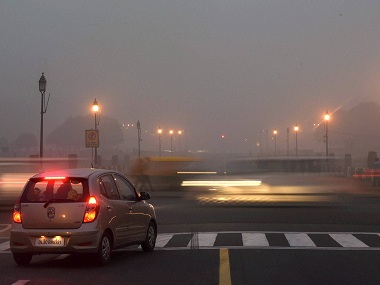Arvind Kejriwal govt proposes aerial sprinkling of water to douse dust pollution in Delhi
New Delhi: The Delhi government wrote to the Centre on Monday requesting it to sprinkle water from choppers or any other aircraft to settle dust, a major source of air pollution in the city.
The city government said it was ready to bear the expenses that would entail any such exercise using its air ambience fund, a corpus created out of Rs 25 paisa cess on every litre of diesel sold in Delhi.
However, environment minister Imran Hussain’s letter to his Union government counterpart Harsh Vardhan on the issue had no information on how such a plan would be executed in a city as large as Delhi.
The air ambience fund, created in 2008, reportedly had around Rs 240 crore till last year, of which about a fraction had been used in subsidising electric vehicles.
File image of vehicles ply on smog covered Rajpath in New Delhi. PTIFile image of vehicles ply on smog covered Rajpath in New Delhi. PTI
Queries to multiple officials of the the Delhi Pollution Control Committee (DPCC), which maintains the corpus, on the current size of the corpus went unanswered.
“In view of the continuous poor quality air in Delhi, it is requested that your good office may kindly propose to the Ministry of Civil Aviation to carry out an exercise to sprinkle water aerially through helicopter/aircraft to settle particulate matter in Delhi,” Hussain wrote.
Last October, the AAP government had announced a plan to put in place three-tier air treatment system, including setting up of wind purification units, mist fountains and virtual chimneys at five major traffic intersections on a trial basis.
Later, when pollution had reached alarming levels after Diwali, the government announced a plan to install outdoor air purifiers at five major traffic intersections, Anand Vihar, ITO, Sarai Kalen Khan, Kashmere Gate and IIT (Delhi) or AIIMS.
But these proposals have not seen much progress in terms of implementation.
Anumita Roychowdhury, who spearheads the Centre for Science and Environment’s (CSE) projects against air pollution, said a comprehensive plan to tackle the pollution crisis, which was submitted to the Supreme Court earlier this year, deals with the dust issue and spells out a raft of preventive measures.
“I do not know how aerial sprinkling would be executed and what quantum of water we are talking about. But the comprehensive plan which talks about paving of roads and road shoulders, vacuum cleaning, localised sprinkling of recycled water, setting up of water fountains at major traffic intersections and maintaining pothole-free roads among other measures should be executed,” she said.
The Supreme Court-appointed Environment Pollution (Prevention and Control) Authority has tasked the authorities in Delhi-NCR with preparing a list of roads in a state of disrepair and contributing to dust pollution.
EPCA chairman Bhure Lal said after the identification of the “high-impact” roads, including NH-24, urgent dust-control measures would be taken up as part of the larger action plan to contain pollution levels, which spiralled after Diwali, but has since come down significantly.
The Central Pollution Control Board (CPCB) recorded an air quality of index (AQI) of ‘very poor’ with a score of 306 for the city on Monday, as against Sunday’s 319.
Hussain held a review meeting with officials of the environment department and the DPCC, where he was informed that air quality this year was “relatively better than 2016”.
This trend can be attributed to improved wind conditions post Diwali, the government said in a statement.
An IIT-Kanpur study on Delhi’s air pollution, considered the most comprehensive report on the issue till date, had identified road dust as the biggest source of suspended particulate matter in the city.
According to the report, road dust makes up over 50 percent of the total PM10 particles and about 38 percent of PM2.5 particles. PM2.5 and PM10 are the most dominant pollutants in Delhi’s air.
These ultra-fine particulates, which can measure up to 30 times tinier than the width of a human hair and reach the bloodstream of a person through the respiratory system, pose serious health risks.




